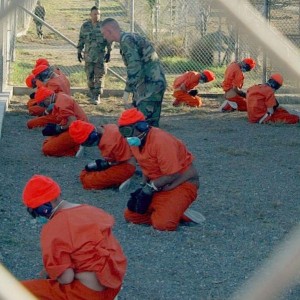Some of the original detainees jailed at the Guantanamo Bay prison.
It is a bedrock principle of our system of justice that everyone who is charged with a crime is presumed innocent unless and until proven guilty. That includes "high-value detainees" awaiting trial in Guantanamo's military commissions. Yet pre-trial hearings held June 17-21 in the cases of five men charged with planning the 9/11 attacks revealed a clear presumption of guilt on the part of the government.
Khalid Shaikh Mohammad, Walid Muhammad Salih Mubarak bin 'Attash, Ramzi bin al Shaibah, Ammar al Baluch, and Mustafa Ahmed Adam al Hawsawi have been charged with crimes for which they could be sentenced to death. Regardless of the emotions surrounding the terrorist attacks, these defendants must be treated fairly, in accordance with the law.
Judge James Pohl, who presides over these cases, took the motions under advisement. That means he postponed ruling on them until later. Although one defendant filed a motion to prevent the government from force-feeding him, that motion was not heard.
Defense attorneys argued that high government officials exerted undue influence on the charging of their clients. The Military Commissions Act (MCA) expressly prohibits "any person" from unlawfully influencing or coercing the action of a military commission. Yet top U.S. officials proclaimed the guilt of some of the defendants before they were charged and their cases set for trial in the military commissions.
President George W. Bush made more than 30 public statements directly implicating Khalid Shaikh Mohammad in the 9/11 attacks; some of Bush's statements also named Ramzi bin al Shaibah and Mustafa Ahmed Adam al Hawsawi. Defense Secretary Donald Rumsfeld and White House Press Secretary Ari Fleischer made similar statements.
President Barack Obama, Vice President Joe Biden, and Attorney General Eric Holder referred to the defendants as "terrorists." Holder named all five defendants as "9/11 conspirators." Obama and White House Press Secretary Robert Gibbs specifically referred to Mohammad, as did Sens. John McCain, R-Arizona, and Lindsey Graham, R-South Carolina. The guilt of the defendants, all of whom face the death penalty, was pre-determined.
Defects in the charging process
Mohammed al Qahtani was charged in 2008 along with the five defendants in the present case. But Susan Crawford, the former Convening Authority (CA) -- who decides whether and what to charge against defendants in military commissions -- determined that al Qahtani's case should not be referred for prosecution. The CA found that "[w]e tortured [Mohammed al] Qahtani ...His treatment met the legal definition of torture. And that's why I did not refer the case" for prosecution.
Torture of the present defendants may well have affected the decision to charge them as well, and particularly, whether to seek the death penalty (capital charges). CA Adm. Bruce MacDonald testified that a capital referral was not a foregone conclusion. But defense counsel were prevented from effectively developing that information.
The Sixth Amendment to the Constitution assures the right to effective assistance of counsel when the government is considering whether to pursue the death penalty. Yet the period preceding the formal charging of these defendants was replete with insurmountable obstacles to "learned counsel," making their assignment meaningless.
Under the MCA, defendants have the right to learned counsel, who are learned in applicable law relating to capital cases, to ensure defendants are effectively represented. But several roadblocks to their representation rendered their assignment mere window-dressing.
Learned counsel were denied timely security clearances, so they were unable to meet with their clients or read 1,500 pages of classified documents. The denial of access to the clients damaged the attorney-client relationship and prevented the defense from building rapport, which is essential in eliciting from the accused facts and circumstances that could lessen his culpability or establish actual innocence.
Because professionals known as "mitigation specialists" were also denied security clearances, they, too, could not meet with the accused to assist in the gathering of information the defense could submit to prevent their clients from being charged with the death penalty.
According to American Bar Association Guidelines, a mitigation specialist is considered: "an indispensable member of the defense team throughout all capital proceedings. Mitigation specialists possess clinical and information-gathering skills and training that most lawyers simply do not have."
Furthermore, the accused were denied qualified and security-cleared translators, and one defendant had no case investigator until weeks before the charges were referred to the commission. Finally, there was a total obstruction of privileged attorney-client communications.
Thus, counsel were stymied in their efforts to effectively communicate with their clients about their detention, interrogation and torture by the U.S. government, life history, current and past mental statuses, current location of their family, and the whereabouts of any educational, medical, or other records.
(Note: You can view every article as one long page if you sign up as an Advocate Member, or higher).






